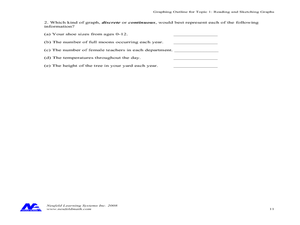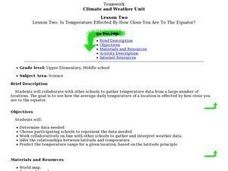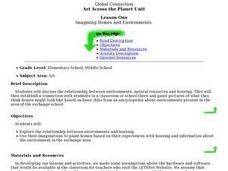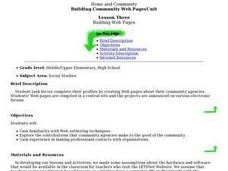Curated OER
Passport to Africa
Students begin the lesson by reading a novel about the diversity of geography in Africa. They are to create an oral report based on information they research. They also communicate with someone through email about the situation in Africa.
Curated OER
Reading and Sketching Graphs
In this graphs worksheet, students answer 15 multistep questions about graphs. Students determine distance traveled, time, velocity, and create scenarios to fit the graph.
Curated OER
What Causes Irregular Temperature Patterns?
Students examine common trends in climate across the U.S. They identify the anomalies in hot-cold temperature differences in the U.S and locate them on the map using latitude and longitude coordinates.
Curated OER
Is Temperature Effected By How Close You Are to the Equator
Students collaborate with other schools to gather temperature data from a large number of locations. They determine how the average daily temperature of a location is affected by how close you are to the equator.
Curated OER
Research and Report
Students use the Internet and other resources to locate, read and summarize information relevant to the Heart.
Curated OER
Technology's Influence on Language
Students use Internet resources to examine the influence of technological terminology on English and other languages.
Curated OER
Essay Exchange Unit: Final Drafts
High schoolers develop final versions of their position papers and add them to the school's web pages for review and feedback.
Curated OER
Mapping Your Neighborhood
Students use atlases, maps, and Web resources to generate and examine maps of their own neighborhoods.
Curated OER
Creating a Map for Future Reference
Students use Web and other resources to create maps of either the site of their day trip, their final destination, the entire trip, or some combination of these.
Curated OER
Stopping Along the Way
Students use atlases, maps, and Web resources to plan a day trip to at least one city or point of interest that is on the way to their final destination.
Curated OER
Earth Day Trash Survey Unit
Students develop an action plan to prevent trash from becoming a problem in the future.
Curated OER
Earth Day Trash Survey Unit
Students analyze the data from questionnaires to prepare a report. They distribute the report via e-mail or through a report published on a Web page to those who participated.
Curated OER
Earth Day Trash Survey Unit
Students develop a questionnaire to distribute via e-mail or Web page forms that visitors fill out based on the data they gathered during their clean-up activities.
Curated OER
Creating a Web Cookbook
Students use software to write a menu, including suggestions based on their own experiences cooking them, cultural and social context for their recipes and pictures or graphics. They shop for and cook the dinner for their families.
Curated OER
Selecting and Analyzing Recipes
Learners use the Web and other resources provided to select several recipes to combine into a menu they can cook for their families at home. They develop a sense of how food is prepared and kinds of preparation necessary to cook their...
Curated OER
Share Classroom Fat Data with Other Students
Students research eating habits in different places and in different cultures.
Curated OER
Comparing Asian and Impressionist Landscapes
Students draw on their knowledge of Impressionist and Asian landscapes to reflect on the differences found in the two genres of landscape painting.
Curated OER
Exploring Homes and Resources
Students search for images of and information about the exchange country's environments and housing, using a variety of sources, and evaluate primary sources of information in terms of accuracy and usefulness.
Curated OER
Imagining Homes and Environments
Learners discuss relationship between environments, natural resources and housing, establish connection with students in classroom or school there, and paint pictures of what they think homes look like based on basic data about environment.
Curated OER
Art Across the Planet
Students create drawings of their own homes and those that they imagine might be found in a foreign country, conduct research on that particular foreign country using exchange artwork and questions with another group of students in that...
Curated OER
Selecting A Destination
Middle schoolers utilize atlases, maps, and Internet resources to select destinations and places to stop along the way on a day trip. They examine and write about the reasons they want to visit the particular places they chose.
Curated OER
Letters to Local and State Legislators
Young scholars locate their local or state legislator's address. They write and send letters to their local and state legislators critiquing their voting record on environmental issues and sharing their own views on these issues.
Curated OER
Environmental Voting Records of Legislators
Young scholars collect and record data on the environmental voting record of their local and state legislators using the Internet. They identify examples of environmental problems or endangered species in their state.
Curated OER
Building Web Pages
Young scholars examine local community agencies and their contributions to the community. They create Web pages that profile the community agencies and their interviews with the volunteers.

























